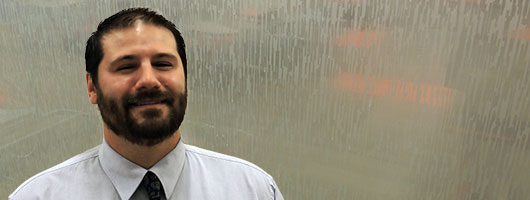 Pictured | Ian C. Clift, Ph.D. | Mayo Graduate School, 2014 | Program Director of Clinical Laboratory Science; and Clinical Associate Professor of Clinical Laboratory Science
Pictured | Ian C. Clift, Ph.D. | Mayo Graduate School, 2014 | Program Director of Clinical Laboratory Science; and Clinical Associate Professor of Clinical Laboratory Science
Division of Clinical Laboratory Science
Ian C. Clift, Ph.D. | Program Director
Riverside 151 | (574) 520-4187
healthscience.iusb.edu/clinical-laboratory-science/index.html
Faculty
- Program Director | Clift
- Clinical Associate Professor | Clift
- Clinical Assistant Professors | Spinda
About the Division of Clinical Laboratory Science
The Bachelor of Science in Clinical Laboratory Science (CLS) provides the entry-level education needed for employment as a Medical Laboratory Scientist (MLS). The CLS curriculum combines science, medicine, and diagnostic testing to train individuals in clinical chemistry, blood banking, body fluid analysis, hematology, hemostasis, immunology, and microbiology. The on campus learning environment is a recently renovated, dedicated classroom and student laboratory at Dwyer Hall.
Graduates are eligible to sit for the American Society for Clinical Pathology Board of Certification (ASCP BOC) exam to obtain national certification as a Medical Laboratory Scientist (MLS). Career opportunities include clinical diagnostics in private and public hospitals and reference laboratories, research laboratories, industry research and development, field service operations, regulatory operations, and academia.
The Division of Clinical Laboratory Science offers three options to complete the Bachelor of Science in Clinical Laboratory Science program.
- Traditional four year bachelor degree.
- Second degree option for individuals with a bachelor degree in biology, chemistry, or other related field.
- Associate in Medical Laboratory Technician (MLT) to CLS degree completion.
Mission Statement
The Division of Clinical Laboratory Science, within the Vera Z. Dwyer College of Health Sciences, is focused on training healthcare professionals in clinical, diagnostic, and therapeutic laboratory operations and related skills. In addition, the department is focused on developing community outreach and advocacy in the field of Medical Laboratory Science and related professions as well as developing diverse interprofessional collaborations that involve clinical laboratory analysis and research.
Educational Goals
The Division of Clinical Laboratory Science believes in providing students with the knowledge and skills needed to become effective laboratory professionals. The Bachelor of Science in Clinical Laboratory Science is designed around the creation of a well-rounded entry level laboratory professional. This includes generalized knowledge in the following professional practice areas defined by the National Accrediting Agency for Clinical Laboratory Science (NAACLS):
- Address pre-analytical, analytical, and post-analytical components of laboratory.
- Prepare students to perform diagnostic assays, use troubleshooting techniques, interpret results, and evaluate.
- Address quality assurance, quality improvement, and continuous assessment of laboratory services.
- Address the importance of safety and application of government regulations and standards in the clinical.
- Foster growth through professional conduct and continuing professional.
Program Outcomes
At the completion of the clinical laboratory science program, students will be able to:
- Synthesize the fundamental biological sciences necessary for integration into clinical laboratory diagnostics.
- Have entry-level professional knowledge in the most common areas of the clinical lab, including Hematologyand Hemostasis, Clinical Chemistry, Urinalyses and Body Fluid Analysis, Clinical Microbiology, and Blood banking.
- Understand the professional, ethical, and practical responsibilities of laboratorians in the interdisciplinary health care team.
- Be prepared to sit for the national certification exam offered through the American Society of Clinical Pathology Board of Certification (ASCP BOC) or an equivalent certifying agency.
NAACLS Accreditation
The IU South Bend Clinical Laboratory Science program is accredited by the National Accrediting Agency for Clinical Laboratory Sciences (NAACLS), which allows all students who graduate from this program to sit for the American Society for Clinical Pathology Board of Certification (ASCP BOC) MLS certification exam and/or the American Medical Technology (AMT) Medical Technologist certification exam.